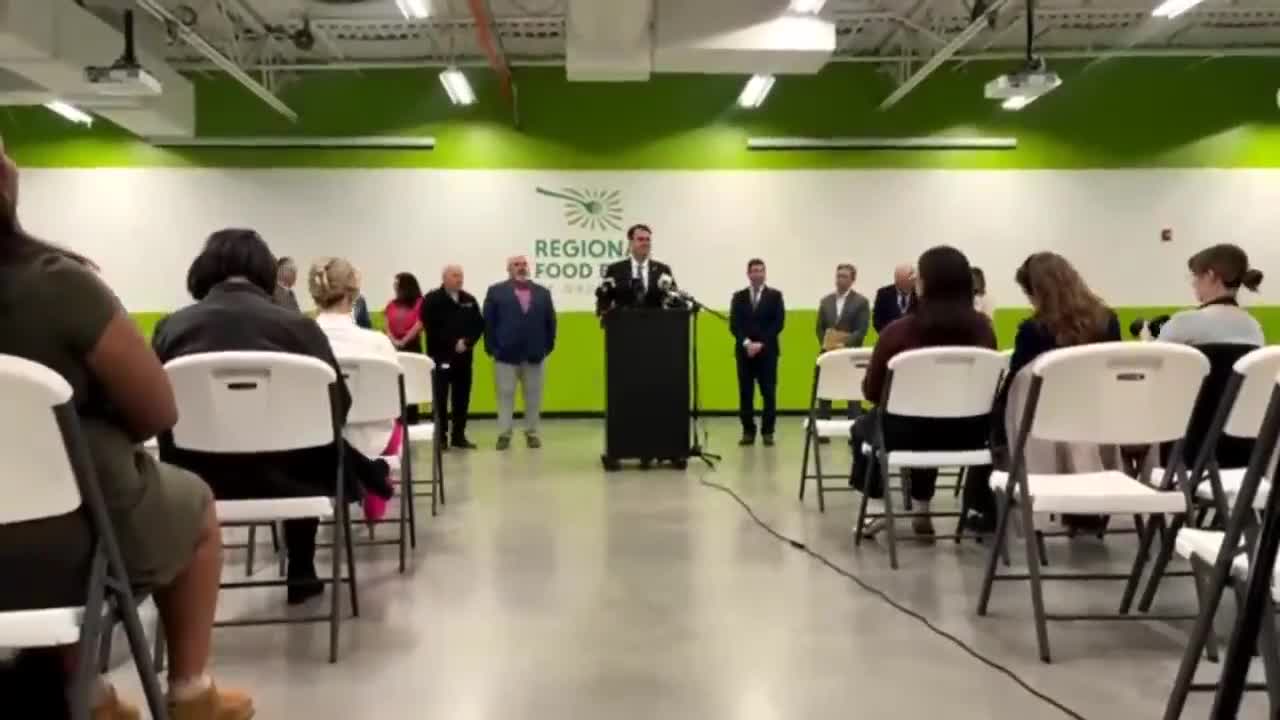Oklahoma governor urges community action as federal shutdown threatens SNAP benefits
Get AI-powered insights, summaries, and transcripts
Subscribe
Summary
Governor Kevin Stitt said a federal shutdown could stop SNAP payments on Nov. 1, cited state shortfall estimates and urged churches, nonprofits and local partners to fill gaps while the state explores options including limited use of the rainy day fund.
Governor Kevin Stitt said Thursday that a federal government shutdown could halt Supplemental Nutrition Assistance Program payments to Oklahomans on Nov. 1 and urged churches, nonprofits and local agencies to step in to help families while federal lawmakers resolve funding.
"Right now, we're facing a serious situation here in Oklahoma. Due to the ongoing federal shutdown, SNAP benefits will not be replenished by the federal government on November 1," Stitt said. He told reporters the state estimates a shortfall of "$205,000,000" affecting Oklahoma in November and said that if the shutdown continued into December the shortfall would be a "minimum of $4,850,000,000," figures he attributed to the state's calculations.
Stitt said the halt in federal funding is a federal issue that requires action in Congress — specifically passage of a continuing resolution (CR) — but that the state is preparing contingency steps. "So what are we doing here in the state of Oklahoma to help? While we're continuing to push for action, we're also mobilizing and working to make sure that Oklahomans can weather this storm," Stitt said.
Why this matters: SNAP is the primary federal program that provides food-purchasing assistance to low-income households. A pause in benefit issuance could increase demand on food banks and charity networks and affect grocery retailers that rely on SNAP spending, a consequence Stitt highlighted when urging residents to support local food distribution efforts.
State options and limits Stitt said Oklahoma's budget position includes a historically large rainy day fund but stressed legal and practical limits on using it to replace federal benefits. "Constitutionally, [we] maxed out the rainy day fund. I can't put another dollar in it," he said, adding that tapping some reserve accounts would not guarantee federal reimbursement. He told reporters the rainy day fund is "close to a billion dollars" and described procedures and voting thresholds required to access parts of it, saying an access mechanism would require a special legislative process.
Stitt said the state is in contact with federal and state legislators and is coordinating with state agencies and county partners on distribution options, and that logistics — including accessing existing benefit cards and making physical delivery of emergency aid — complicate immediate state-funded replacement of SNAP benefits.
Community mobilization Several faith leaders and nonprofit representatives standing with Stitt described local preparedness plans. "If 5,000 churches at the State of Oklahoma ... begin to put together 15 boxes of emergency food ... twice a month," said Cody Anderson, who identified himself as senior pastor at a church campus, "we can make a huge dent." Anderson and other pastors urged congregations to prepare emergency food boxes and to sign up with local distribution networks.
Resources and guidance Stitt directed Oklahomans seeking help to a central sign-up site mentioned during the event: beaneighbor.org, which he said lists churches, food banks and nonprofits that can provide immediate assistance. He also said some federal programs such as WIC and school-related programs are being monitored and, at the time of the press conference, were not broadly disrupted.
Questions from the public and next steps When asked by a reporter what message he had for families who rely on SNAP, Stitt urged optimism that Congress would act while emphasizing state planning. He reiterated outreach to churches and county partners and said state leaders are examining distribution points and other logistical solutions for rural and urban areas.
No formal state action was announced at the press conference; Stitt characterized many remedies as contingent on federal resolution or on options that would require legislative steps. He said state officials will continue coordinating with nonprofits, faith groups, county partners and the state's federal delegation while monitoring program impacts.
Ending note Stitt closed by calling on Oklahomans to "be neighbor" to one another and to support local food banks and churches as an interim response while urging federal lawmakers to pass a clean continuing resolution to restore federal funding flows.
